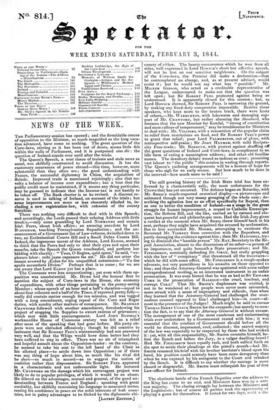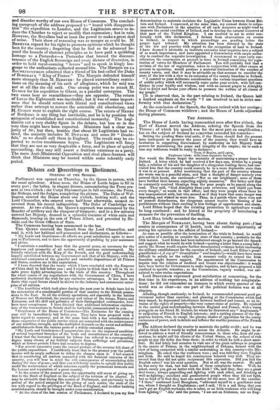The obstinate battle of the French Deputies over the address
to the King has come to an end, and Ministers have won by a nar- row majority. The closing struggle lay between the Ministers and the Legitimists ; but of course all parties took the opportunity of playing a game for themselves. It lasted for two days, amid a din
and disorder worthy of our own House of Commons. The conclud- ing paragraph of the address proposed to " brand with disapproba- tion" the expedition to London, and the Legitimists strove to in- duce the Chamber to reject or modify that expression ; but in vain. However, the Royalists had at least the power to make a great deal of noise. Their show of reasoning was as meagre as could be. M. %RIME argued for his right to promote opinions which he thought best for the country ; forgetting that he had so far advanced be- yond the bounds of abstract principles as to have paid a quibbling homage to a Pretender—a Pretender that braved the discoun- tenance of the English Sovereign and every dictate of discretion, in order to hold royal-seeming " levees " and to speak in kingly lan- guage to the enthusiasts collected around him. The Marquis DE LA ROCHEJACQUELIN admitted that a friend of his had called the Duke of BORDEAUX "King of France." The Marquis defended himself more strangely than M. BERRYER : he placed extraordinary restric- tions on the meaning of his oath of allegiance, which he said was Dot at all like the old oath. One strong point was to attack M. GUIZOT for his expedition to Ghent, as a parallel enterprise. The two cases bear no resemblance—they are opposite. The return of Louis the Eighteenth was inevitable; but it was of some import- ance that he should return with liberal and constitutional views rather than attempt to restore the untenable old absolutism, and M. Guizox went to explain the right course. The return of HENRY of Bordeaux is any thing but inevitable, and he is by position the antagonist of established and constitutional monarchy. The Legi- timists cut a very shabby figure in the debate, but less so in the vote than might have been expected. Ministers had a clear ma- jority of 30; but then, besides that about 20 Legitimists had re- tired, the majority includes M. DUPAURE and some 20 " Doubt- fuls," as we should call them in England. The result may be ex- pected to revive troublesome hopes. The Legitimists will fancy that they are not so very despicable a force, and in place of quietly succumbing, they may still assert a fruitless existence as a party. The mere Anti-Ministerial Opposition and rival place-hunters will think that Ministers may be ousted within some tolerably early period.



























 Previous page
Previous page